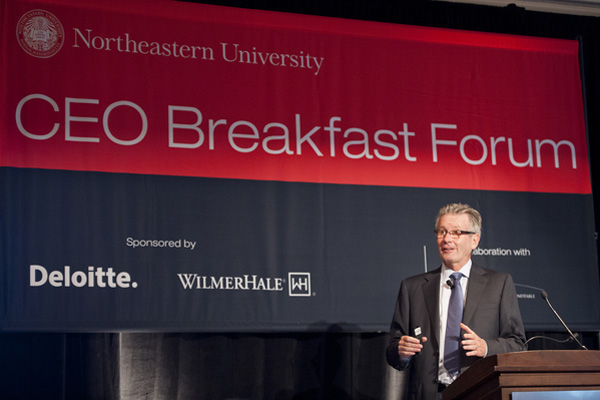Not just America runs on Dunkin’

The creative tagline for popular Dunkin’ Donuts television advertising is “America runs on Dunkin’.” But the company’s global presence is a critical component of its business that presents country-specific opportunities and challenges, according to Nigel Travis, chief executive officer of Dunkin’ Brands and president of Dunkin’ Donuts U.S.
Travis, the keynote speaker at Northeastern University’s CEO Breakfast Forum on Thursday morning, said American companies must be resilient, take a long-term view and be fully committed when expanding into international markets.
Dunkin’ Brands—which includes Dunkin’ Donuts and Baskin-Robbins and operates on a franchise-model—is present in nearly 60 countries worldwide, with particular strengths in more established markets in Asia and the Middle East. Travis identified Europe and Latin America as great opportunities for growth.
To globalize successfully, Travis said American businesses must think of the international market as a series of different cultures and countries, rather than as one entity. Grasping those cultural differences, he said, is crucial in making business decisions, from what food selections to offer in a specific market to what time of day to hold an international conference call. Hiring employees with international experience, he added, is a smart business strategy to help navigate these differences.
Understanding how the American lifestyle is unique to rest of world is also important, he said. For instance, Travis said none of the Dunkin’ Donuts locations in China have a drive-thru, yet 82 percent of new locations in the U.S. do have one.
In summary, he said: “Think global. Act local.”
Northeastern’s CEO Breakfast Forums invite leading CEOs to speak to an audience of other CEOs and senior executives from the Greater Boston area.
Northeastern University President Joseph E. Aoun noted that in many ways, the company’s trajectory has mirrored that of Northeastern by maintaining a local, national and global perspective. In the last year, the university has launched regional campuses in Charlotte, N.C., and Seattle, Wash., while Northeastern’s global presence includes experiential-learning opportunities for students in 92 countries and research partnerships worldwide.
“The thirst for this kind of higher education that is blending the world experience with the classroom experience is something that is ideal all over the world,” Aoun said.
Mobile technology has been a game-changer for businesses and globalization, said Travis, who during the Q&A portion of the event elaborated on how his company’s new mobile app has impacted the brand and customers’ in-store experience. Launched in August, the app allows customers to use their smartphones to pay for food, beverages and merchandise and send virtual gift cards via text, email or Facebook.
Travis said the app has yielded enormous benefits, from shorter transaction times to cost savings for its franchisees. The ability to connect with customers individually with specific offers and other marketing opportunities is also a significant benefit, he said.
“This is the future,” Travis said of mobile apps. “It’s going to revolutionize retailing.”




